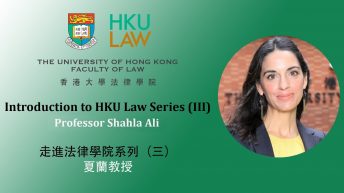00:10 What made you decide to come to HKU? 什麼促使你決定來香港大學?
00:35 What was your first impression of HKU? 對香港大學的第一印像
01:12 What do you think of the students at HKU? 香港大學的學生?
01:50 How does your experience at HKU compare to other universities you have worked at? 與你工作過的其他大學相比,你覺得香港大學如何?
02:37 What has been the most memorable experience in your teaching career? 教學生涯中最難忘的經歷
03:33 Can you tell us about your hobbies and interests? 興趣和愛好
04:09 How do you manage your time? 如何管理時間
05:00 Can you tell us about the music you play? Do you have a favorite tune? 愛演奏什麼音樂?最喜歡哪首歌曲?
06:54 What is your favorite book? 最喜歡的書
07:34 Why did you choose to become a professor rather than, for example, a lawyer? 為何選擇成為教授而非律師?
09:15 What made you choose comparative constitutional law as your area of focus? 為何選擇比較憲法作為研究領域?
12:40 What is beneficial about having a broad range of research interests? 擁有廣泛的研究興趣帶來了哪些好處?
15:29 What is your interest in Chinese law and the recently adopted Chinese Civil Code? 中國法和最近通過的《民法典》如何吸引你?
19:50 How does your scholarship in comparative law inform your understanding of Chinese law? 比較法學術研究如何幫助你了解中國法?
21:51 Do you have any advice on what research methods to employ when studying a new legal system? 你對新法制的研究方法有何建議?
28:24 Do you have a preference for quantitative or qualitative methods? 你喜愛定量還是定性方法?
33:31 What do you mean when you say the proportionality analysis is intrusive? Do you think it should be reformed? 當你說比例原則分析是侵擾性時,是認為它應該改革?還是有其他意思?
42:00 Can you tell us your thoughts on the growth of the administrative state? How would you suggest maintaining a balance between empowerment and limiting government power? 對行政國家發展有何看法?如何建議在賦權和限制政府權力之間保持平衡?
46:46 Do you have any career advice for young scholars? 對年輕學者的建議




